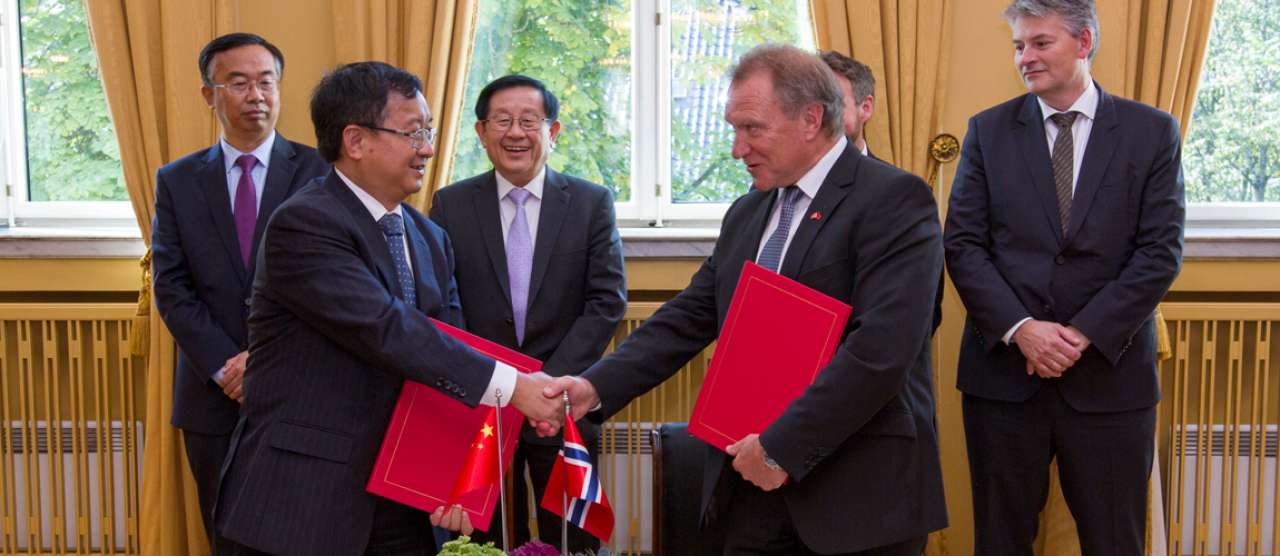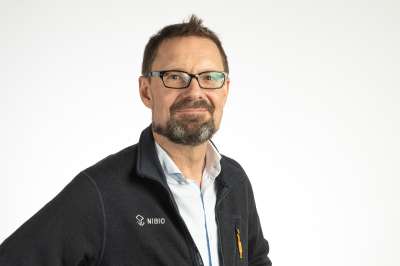Chinese CAAS and NIBIO signed agreement on research collaboration

NIBIO and the Chinese agricultural academy CAAS have today signed a Memorandum of Understanding on further collaboration on research and technology development related to food security, food safety and climate smart, sustainable agriculture.
The Chinese Academy of Agricultural Science (CAAS) and the Norwegian Institute of Bioeconomy (NIBIO) have today signed a Memorandum of Understanding to promote bilateral collaboration for the benefits of both countries and organizations.
The agreement was signed in a ceremony in Oslo, where both the Chinese Minister of Science and Technology Wan Gang and the Norwegian Minister of Education and Research Torbjørn Røe Isaksen were present.
World leaders
- We are very pleased that our relations with China, and the agriculture and environmental research there, is getting such an advanced position that the two countries’ respective research ministers are hosting the signing of our Memorandum of Understanding with CAAS, says Nils Vagstad, Managing Director of NIBIO.
It has been 13 years since CAAS and NIBIO first met. Since then, there have been many meetings and the institutes have developed collaboration within many fields of research.
According to Vagstad, CAAS is on its way to become a world leader, and he believes that going forward, this partnership will be important to both NIBIO and Norway. The Veterinary Institute is also an important part of this alliance, and Vagstad says he is pleased that the agreement will create opportunities for the Veterinary Institute to contribute to the future collaboration.
He underlines that for NIBIO, it is crucial to have a global view through seeking cooperation and bringing home knowledge and ideas.
- And we hope that our experience and knowledge can also be useful for CAAS. This is the core in all our success - development through mutual knowledge and technology exchange. That we are different in several areas and have diverse experiences and history are important factors that contribute to synergy, Vagstad pointed out in his speech.
Possibilities in the High North
The NIBIO director also highlighted that Norway and NIBIO represent a unique access to Arctic ecosystems with biological possibilities, undiscovered potential and untapped resources.
- At the same time, the High North is a unique laboratory to develop more knowledge on climate change and its consequences. We already know that CAAS has valuable expertise that could be important in order to gain more knowledge of the Northern and Arctic systems, he said.
- In the agreement we have signed, we also set out to develop a common research centre looking at the Arctic climate and collaborating on ecosystem research and innovation from our station Svanhovd in Sør-Varanger municipality, concludes Vagstad.
The research collaboration has been supported by the Norwegian Research Council, the Ministry of Agriculture and Food, the Chinese Ministry of Agriculture and the Ministry of Science and Technology in China.
Contacts

Key areas of collaboration
The institutes will encourage scientific and technical cooperation between their scientific organizations in accordance with respective valid laws and regulations. Key areas include:
- Food security and sustainable agriculture, including plant health, animal health and sustainable use of natural resources
- Food safety and public health, including antimicrobial resistance (AMR) and pesticide residues in food and feed
- Technological innovations to support climate smart and environmental friendly agriculture
- Monitoring and surveillance programs for the quality of agricultural products and production
- Biotechnology and innovation to further strengthening of the bio-economy sector
- Climate changes and adaptations, especially in northern latitudes and high altitudes, in particular the establishment of Sino-Norwegian Arctic Climate and Innovation Centre at Svanhovd, Norway
Contacts

